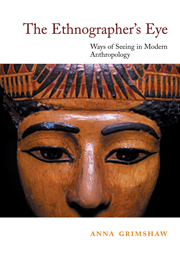Book contents
- Frontmatter
- Contents
- Preface
- Acknowledgements
- Introduction
- Part I Visualizing anthropology
- 1 The modernist moment and after, 1895–1945
- 2 Anxious visions: Rivers, Cubism and anthropological modernism
- 3 The innocent eye: Flaherty, Malinowski and the romantic quest
- 4 The light of reason: John Grierson, Radcliffe-Brown and the enlightenment project
- Part II Anthropological visions
- Epilogue
- Notes
- Index
4 - The light of reason: John Grierson, Radcliffe-Brown and the enlightenment project
Published online by Cambridge University Press: 05 June 2012
- Frontmatter
- Contents
- Preface
- Acknowledgements
- Introduction
- Part I Visualizing anthropology
- 1 The modernist moment and after, 1895–1945
- 2 Anxious visions: Rivers, Cubism and anthropological modernism
- 3 The innocent eye: Flaherty, Malinowski and the romantic quest
- 4 The light of reason: John Grierson, Radcliffe-Brown and the enlightenment project
- Part II Anthropological visions
- Epilogue
- Notes
- Index
Summary
The final part of my attempt to ‘visualize’ anthropology in the period of its early twentieth-century development addresses the question of an enlightenment way of seeing. For scientific ethnography has at its centre a distinctive vision of the world. It is one, I will suggest, that finds its counterpart in the documentary cinema of the interwar years. I propose to examine the features of this enlightenment vision through a consideration of the work of John Grierson and Radcliffe-Brown. Juxtaposing two key figures in this way extends the range of symbolic connections which I have already pursued in relation to anthropology and cinema using the examples of Lumière and Haddon, Griffith and Rivers, and Flaherty and Malinowski.
At the outset I must confess that although I recognise both Radcliffe-Brown and John Grierson to be central figures in the creation of new forms, neither quite stimulates my imagination in the manner of their predecessors. Perhaps my own intellectual training under Edmund Leach presents a fundamental obstacle in appreciating the paradigm of scientific ethnography at the heart of Radcliffe-Brownian anthropology, or ‘butterfly collecting’ as Leach once famously described it. I recognise that one of the problems in trying to respond creatively to the interwar documentary film-makers and anthropologists is that their work is about consolidation rather than innovation. This, by its very nature, limits its experimental scope and range of imaginative possibilities.
- Type
- Chapter
- Information
- The Ethnographer's EyeWays of Seeing in Anthropology, pp. 57 - 68Publisher: Cambridge University PressPrint publication year: 2001



